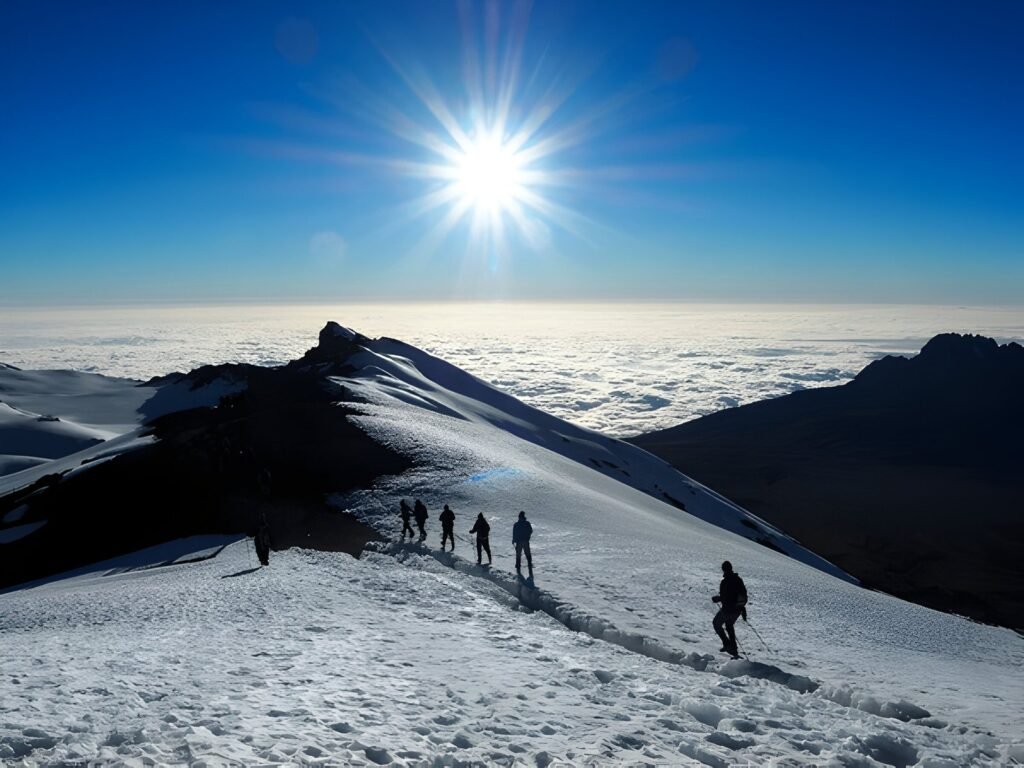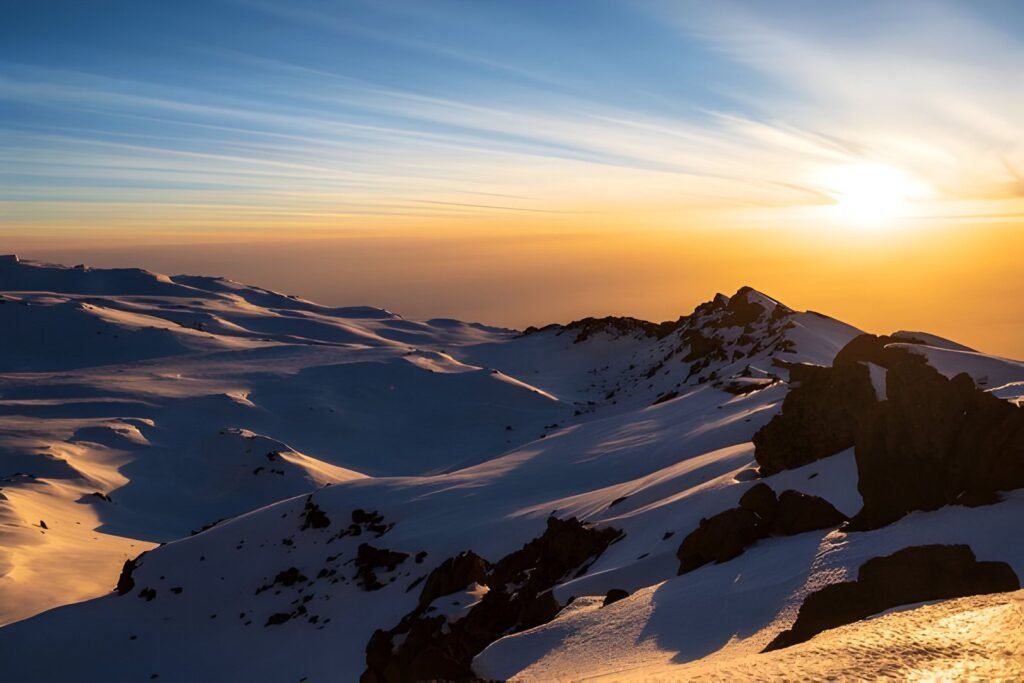10 Essential Tips for a Successful Kilimanjaro Climb : Climbing Mount Kilimanjaro, Africa’s highest peak at 5,895 meters (19,341 feet), is an adventure of a lifetime. While it’s not a technical climb, the altitude and physical endurance required make it a challenging trek. With the right preparation, anyone can reach the summit and experience the breathtaking views at Uhuru Peak.
Here are the 10 essential tips you need to ensure a successful Kilimanjaro climb.

10 Essential Tips for a Successful Kilimanjaro Climb : Choose the Best Route for You
Selecting the right route is key to your success on Kilimanjaro. Different routes offer varying levels of difficulty, scenery, and acclimatization periods.
- Machame Route: The most popular route, known for its beautiful landscapes and high success rate.
- Lemosho Route: Ideal for those looking for a longer climb with excellent acclimatization opportunities.
- Marangu Route: Easier terrain with hut accommodations, but a shorter acclimatization period and lower success rate.
- Rongai Route: Offers a more remote and quieter experience.
Explore Kilimanjaro routes with Kilimanjaro Climb Specialist
10 Essential Tips for a Successful Kilimanjaro Climb : Train for Your Trek
You don’t need to be a mountaineer to climb Kilimanjaro, but you must be physically fit. A solid training plan will help you handle the demands of the trek.
- Endurance Training: Focus on building your cardio fitness through hiking, running, or cycling.
- Strength Training: Exercises like squats, lunges, and core work will prepare you for carrying your daypack and trekking uphill.
- Practice Hikes: Get used to walking long distances and carrying a pack. Hiking on uneven terrain will simulate the conditions on the mountain.
Learn more about fitness training for Kilimanjaro
10 Essential Tips for a Successful Kilimanjaro Climb : Acclimatize to the Altitude
Altitude sickness is one of the biggest challenges on Kilimanjaro. Proper acclimatization is crucial to reaching the summit without getting sick.
- Take It Slow: The saying “pole, pole” (slowly, slowly) is the golden rule. Walking at a slow, steady pace helps your body adjust to the altitude.
- Choose Longer Routes: Opting for routes like Lemosho or Machame gives your body more time to acclimatize.
- Hydration: Drink plenty of water to prevent dehydration, which can worsen altitude sickness.
Find out how to acclimatize effectively on Kilimanjaro
10 Essential Tips for a Successful Kilimanjaro Climb : Pack the Right Gear
Packing the right gear is essential for a comfortable and successful climb. You’ll encounter a wide range of climates, from tropical rainforest to arctic conditions near the summit.
- Layered Clothing: Wear moisture-wicking base layers, insulating mid-layers, and waterproof outer layers.
- Footwear: Sturdy, well-worn hiking boots with ankle support are a must.
- Sleeping Bag: Bring a four-season sleeping bag rated for sub-zero temperatures.
- Daypack: A small backpack with a hydration system to carry water, snacks, and essential gear.
Check out a full Kilimanjaro packing list here
10 Essential Tips for a Successful Kilimanjaro Climb : Hire a Reputable Guide and Team
You cannot climb Kilimanjaro without a licensed guide, and choosing the right tour operator can make or break your experience.
- Experienced Guides: Ensure your guides are experienced and trained in handling altitude sickness.
- Ethical Practices: Choose a company that treats their porters fairly, providing them with proper wages and equipment.
- Positive Reviews: Read reviews and testimonials to confirm the company’s reputation.
Book your Kilimanjaro trek with Kilimanjaro Climb Specialist
Eat and Stay Hydrated
Maintaining your energy levels is crucial on the mountain. Eating enough and staying hydrated will help you power through the long days of trekking.
- Hydration: Drink at least 3 to 4 liters of water a day. Add electrolyte tablets to prevent dehydration.
- Nutrition: Eat high-carbohydrate meals to keep your energy up. Pack snacks like nuts, energy bars, and dried fruit for quick fuel on the trail.
Learn more about proper hydration and nutrition
Take It Slow and Steady
Going too fast can increase the risk of altitude sickness and exhaustion. The key to summiting Kilimanjaro is pacing yourself.
- Pole, Pole: This Swahili phrase means “slowly, slowly,” and it’s the mantra for climbing Kilimanjaro. Slow, deliberate steps will help you acclimatize and conserve energy.
- Listen to Your Body: If you feel the early signs of altitude sickness, such as headaches or dizziness, slow down or take a break.
Read tips on pacing yourself at altitude
Get the Right Travel Insurance
Climbing Kilimanjaro requires comprehensive travel insurance that covers high-altitude trekking and emergency evacuation.
- Altitude Coverage: Make sure your policy covers trekking up to 6,000 meters.
- Evacuation Coverage: In case of severe altitude sickness or an emergency, helicopter evacuations may be necessary.
- Cancellation Coverage: Protect your investment with trip cancellation insurance in case of unexpected changes.
Get travel insurance for high-altitude trekking
Prepare Mentally for the Challenge
While physical fitness is essential, mental toughness is just as important. Kilimanjaro is a demanding trek that will test your resolve.
- Set Realistic Expectations: The climb is tough, but focusing on one day at a time will make it manageable.
- Stay Positive: Keep your spirits up, and encourage your fellow climbers. A positive attitude can make all the difference on tough days.
Learn mental preparation tips for trekking
10 Essential Tips for a Successful Kilimanjaro Climb : Respect the Environment
Kilimanjaro is a UNESCO World Heritage Site and a precious natural environment. It’s essential to leave no trace and practice responsible tourism.
- Pack Out Trash: Always carry your trash with you and dispose of it properly.
- Stick to the Trails: Stay on designated paths to minimize your impact on the environment.
- Choose Sustainable Operators: Support companies that prioritize sustainable practices and respect for local communities.
Support sustainable tourism on Kilimanjaro

10 Essential Tips for a Successful Kilimanjaro Climb : FAQs
1. Do I need special equipment to climb Kilimanjaro?
No technical climbing gear is required, but you need proper hiking gear, warm clothing, and a good sleeping bag.
2. How long does it take to climb Kilimanjaro?
The climb takes between 5 and 9 days, depending on the route you choose.
3. Is it safe to climb Kilimanjaro?
Yes, with proper preparation and the right guide, Kilimanjaro is safe for most people. However, altitude sickness is a risk, so it’s important to acclimatize properly.
Start planning your Kilimanjaro climb with Kilimanjaro Climb Specialist
10 Essential Tips for a Successful Kilimanjaro Climb : Conclusion
Climbing Kilimanjaro is a rewarding experience that requires preparation, fitness, and determination. By following these 10 essential tips, you’ll increase your chances of reaching the summit and enjoying one of the world’s most iconic adventures.
Start your Kilimanjaro journey with Kilimanjaro Climb Specialist
Book your next adventure with Eddy Tours Safaris

